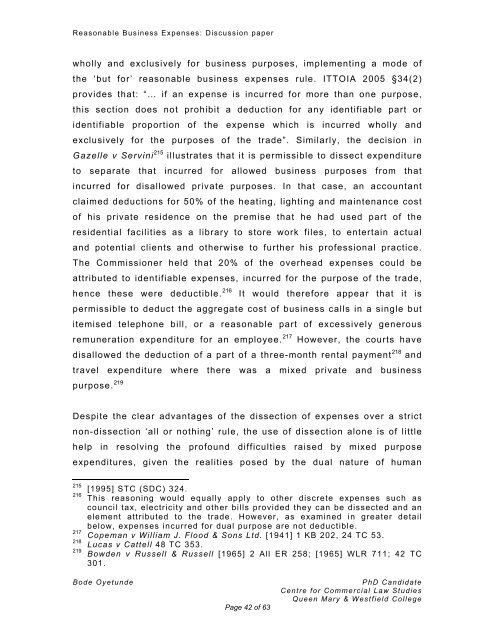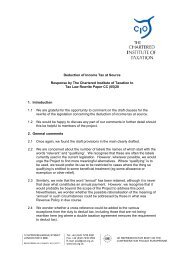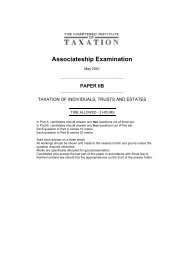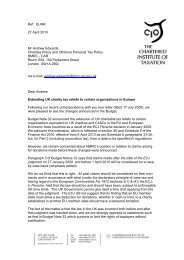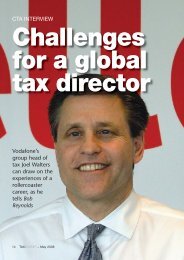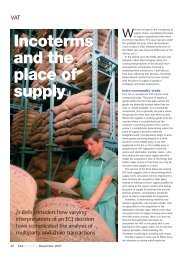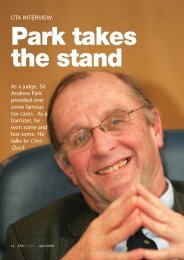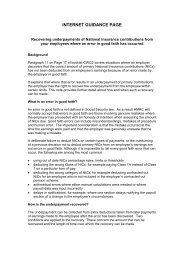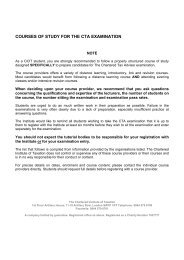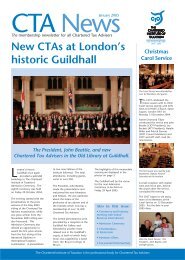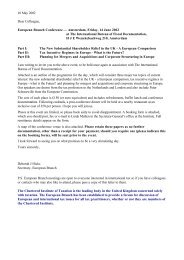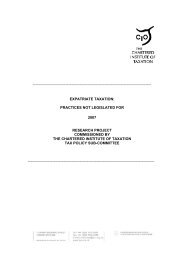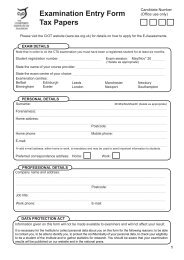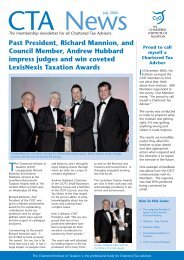Reasonable Business Expense - The Chartered Institute of Taxation
Reasonable Business Expense - The Chartered Institute of Taxation
Reasonable Business Expense - The Chartered Institute of Taxation
You also want an ePaper? Increase the reach of your titles
YUMPU automatically turns print PDFs into web optimized ePapers that Google loves.
<strong>Reasonable</strong> <strong>Business</strong> <strong>Expense</strong>s: Discussion paperwholly and exclusively for business purposes, implementing a mode <strong>of</strong>the ‘but for’ reasonable business expenses rule. ITTOIA 2005 §34(2)provides that: “… if an expense is incurred for more than one purpose,this section does not prohibit a deduction for any identifiable part oridentifiable proportion <strong>of</strong> the expense which is incurred wholly andexclusively for the purposes <strong>of</strong> the trade”. Similarly, the decision inGazelle v Servini 215 illustrates that it is permissible to dissect expenditureto separate that incurred for allowed business purposes from thatincurred for disallowed private purposes. In that case, an accountantclaimed deductions for 50% <strong>of</strong> the heating, lighting and maintenance cost<strong>of</strong> his private residence on the premise that he had used part <strong>of</strong> theresidential facilities as a library to store work files, to entertain actualand potential clients and otherwise to further his pr<strong>of</strong>essional practice.<strong>The</strong> Commissioner held that 20% <strong>of</strong> the overhead expenses could beattributed to identifiable expenses, incurred for the purpose <strong>of</strong> the trade,hence these were deductible. 216 It would therefore appear that it ispermissible to deduct the aggregate cost <strong>of</strong> business calls in a single butitemised telephone bill, or a reasonable part <strong>of</strong> excessively generousremuneration expenditure for an employee. 217 However, the courts havedisallowed the deduction <strong>of</strong> a part <strong>of</strong> a three-month rental payment 218 andtravel expenditure where there was a mixed private and businesspurpose. 219Despite the clear advantages <strong>of</strong> the dissection <strong>of</strong> expenses over a strictnon-dissection ‘all or nothing’ rule, the use <strong>of</strong> dissection alone is <strong>of</strong> littlehelp in resolving the pr<strong>of</strong>ound difficulties raised by mixed purposeexpenditures, given the realities posed by the dual nature <strong>of</strong> human215216217218219[1995] STC (SDC) 324.This reasoning would equally apply to other discrete expenses such ascouncil tax, electricity and other bills provided they can be dissected and anelement attributed to the trade. However, as examined in greater detailbelow, expenses incurred for dual purpose are not deductible.Copeman v William J. Flood & Sons Ltd. [1941] 1 KB 202, 24 TC 53.Lucas v Cattell 48 TC 353.Bowden v Russell & Russell [1965] 2 All ER 258; [1965] WLR 711; 42 TC301.Bode OyetundePage 42 <strong>of</strong> 63PhD CandidateCentre for Commercial Law StudiesQueen Mary & Westfield College


